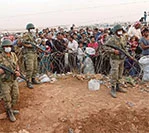Dealing with the IS: A degree of honest analysis is required that will unveil the hidden hands at work and the need to fulfil genuine aspirations of the wider Muslim world
THE ongoing bombardment of Syria — ostensibly to remove the threat of the Islamic State (IS) — has sparked off a bout of serious questioning about the propriety of the campaign, and whether such a strategy would actually work.
Interestingly, many of these questions are also being raised in the Western press, where opinionmakers have argued that such a strategy may well end up entrenching IS further and angering ordinary civilians, who will also be the victims of such attacks, for it is well-known that “smart weapons” are seldom truly smart, and that civilian casualties are bound to be incurred.
But more worrying still is the talk of a “war against evil” and the need to fight against IS in the defence of “civilisation”, “law and order”, and “justice”.
The somewhat simplistic dialectics of such arguments are embarrassingly clear, where the insurgents of IS are being labelled as uncivilised and barbaric, while those who attack them have summarily assumed the mantle of a higher moral authority.
Under such circumstances, is it any wonder if critical thinkers the world over have opined that what we are seeing today is a nasty prelude to a larger conflict that will be fought along the fault-lines of culture and civilisation?
Lest it be forgotten, we need to remember that IS does not represent the civilisation of Arab-Muslims in any way. In their deeds and words IS does not represent the same grand civilisation that was the product of thinkers like al-Ghazali, Ibn Sina, Ibn Rush and Ibn Khaldun.
As many contemporary Muslim leaders have argued, what we see in the ranks of IS is a travesty of Arab civilisation that was once the fountainhead of science and rational thinking. But equally worrisome is the language and vocabulary of IS’s opponents, who have applied to them a pathology that is general, sweeping and reductionist.
To argue, as some Western leaders and policymakers have, that IS is the result of blind hate and anger, would be to reduce the frustrations and anxieties of millions of Arabs to bare emotions and reactionary action, without any attempt to understand and recognise the very real political-economic underpinnings of such collective anxiety.
It is dumfounding that hardly any of these leaders have noted the obvious fact that IS has emerged in a region that has been torn apart for three decades, since the Iran-Iraq war, that was also supported by external states and other actors.
It is equally perplexing to note that none of these leaders have acknowledged their own culpability in their policy of intervening in that region — in the name of “regime change” — and by doing so, weakened the states of the Arab world to the point where none of them can really rein in radical movements and splinter groups like IS. Do we seriously expect a moderate society to emerge from a region that has been reduced to a war zone for so long?
It is for this reason that the term “Clash of Civilisations” is so misleading, and dangerously so. As a glib slogan that reduces and over-simplifies the complexity of the problems of the Arab world, it is a convenient by-word that allows external actors and players to absolve themselves of their own responsibility for the mess they have created.
The term is dangerous in the manner that it reduces the phenomenon of violent radical resistence to the level of primordial irrational sentiments, and reinforces the racist stereotype of Arabs as inherently violent and pathologically fatalistic.
In dealing with the real problem of groups like IS, a degree of honest, objective analysis is required that would also unveil the hidden hands at work, the connections with external agendas and interests.
What we do not need at the moment is some convenient slogan that white-washes the facts about intervention, regime change/manipulation and their monstrous outcomes.
And, we need to remember that the idea of the “Clash of Civilisations” itself is a concept that was never invented by us, but rather imposed upon us and other communities — perhaps in an effort to deny our genuine political-economic needs and aspirations, and to discard serious critical thinking for simplistic oppositional dialectics instead.
Article by Dr Farish Noor which appeared in New Straits Times,
29 September 2014.





